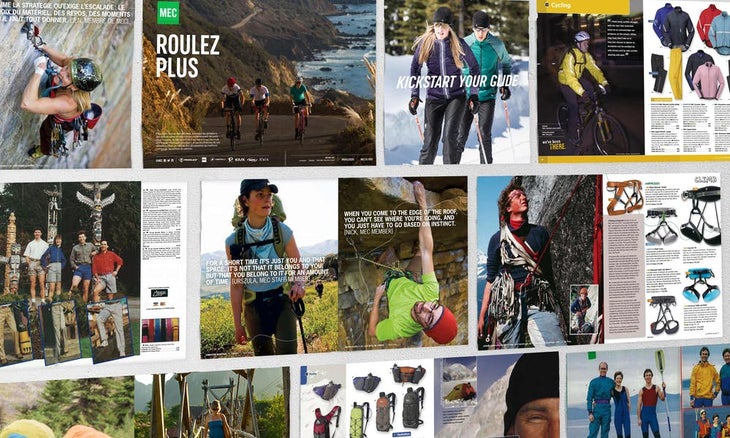In a photograph posted to Instagram early last March, Judith Kasiama is the absolute picture of alpine joy, posed on a summit with a smile as radiant as the snow frosting the peak beneath her feet. The caption, however, reflected the Vancouverite’s frustration with the outdoor industry’s skewed portrayal of what it looks like to enjoy the natural world—namely, the misconception that only white people recreate outdoors.
Kasiama, a hiker, runner, and researcher who first connected with the outdoors as a child in the Democratic Republic of Congo, is black. Despite her own lived experience and her recognition of other BIPoC (Black, Indigenous, People of Color) on local trails, she wasn’t seeing herself—or others—reflected in outdoor media and marketing.
“I’m like, well, I am interested in those things, I do do those things, and I see a lot of community of color doing those things,” she said. “Why aren’t their stories reflected into the media that’s trying to promote physical activity and being out in nature?”
Hoping to spark conversation, Kasiama tagged several outdoor companies in her post. Only one responded—Canadian outdoor retail giant Mountain Equipment Co-op (MEC).
MEC Acknowledging the Problem
Kasiama’s assertion that outdoor companies like MEC have historically perpetuated a distorted view of outdoor recreationalists is one that its CEO David Labistour happens to agree with. In an open letter released earlier this week, he acknowledged the company’s role “in underrepresenting people of colour in the outdoors,” and asserted that, “moving forward, we will make sure we’re inspiring and representing the diverse community that already exists in the outdoors.”
The timing of Labistour’s letter wasn’t spontaneous—it was based on data the company recently received through its regularly-conducted member surveys. The questions within those surveys periodically change, prompted by company research and review of demographic shifts across Canada. In the most recent round, which occurred between Fall 2017 and Spring 2018, a question was added that allowed respondents to indicate whether they identified as a person of color. The collected data showed that people of color in Canada “spend more time and participate in a wider range of outdoor activities than white people.”
“We currently have an executive team which is more female than male. We have a lot of gender diversity in the organization,” said Labistour. “But really, where we’ve dropped the ball is diversity and inclusion through representing the Canadian demographic.” The survey results ramped up the internal work MEC was already doing, which in turn prompted Labistour’s public statement.
The reaction to Labistour’s letter was immediate—and passionate. While many people voiced support on the brand’s Facebook page, there were also detractors who suggested that MEC was simply “virtue signaling,” “dabbling in identity politics,” or “riding the current racism wave to profits.” Labistour is not immune to the feedback. “We’ve had a lot of criticism for grandstanding on this, and I understand there’s a lot of cynicism around brands and business today, so I get it,” he told OBJ. “I think it’s up to us to deliver on it.”
MEC Vows to Go Beyond Lip Service
While some might dismiss Labistour’s statement as nothing more than a public relations stunt to capitalize on “diversity” initiatives and conversations happening across the industry, MEC has spent several years quietly rebuilding their internal infrastructure to prioritize diversity, equity, and inclusion (DEI) within all aspects of the company.
“If we want to be relevant and viable and a trusted brand in the future, we do have to reflect what is happening in our demographics,” said Labistour. “If we really want to build this relevance, it has to be a systemic approach.”

Internally, the company has made shifts across the board, from staff training that addresses implicit bias and its effects on the workplace, to hiring practices that recognize diversity as being about one’s lived experiences, rather than their ability to tick a set of boxes as part of a quota.
In fact, if you apply for a job with MEC, you’ll notice one set of boxes missing from the application—those related to gender. “More and more people are opting out of wanting to be labeled in any context,” said the brand’s chief people experience officer, Nahal Yousefian. “The numbers won’t be able to tell you whether you’re doing a good job, anyways; it’s going to be about…the celebration of diversity that organically happens through the narrative, rather than through the number.”
There’s also an internal Diversity and Inclusion Steering Committee, helmed by Amil Reddy, who leads the brand’s Outdoor Nation program, an effort that encourages and supports young people, ages 18 to 35, to not only engage in outdoor recreation, but also to increase access by leading programs in diverse communities.
They also spearheaded the effort for MEC to be the first Canadian company to sign the Outdoor Industry CEO Diversity Pledge launched by Teresa Baker, founder of the African American Nature and Parks Experience.
While it might appear as though Labistour’s letter and MEC’s overall efforts are solely focused on diversity as it relates to race or ethnicity, Reddy noted that the company is also working to address recreationalists of different abilities and those who have asked for expanded apparel sizing, while also focusing on improving allyship with Indigenous and LGBTQIA+ communities.
“I think that the most important thing would be to just acknowledge that we don’t have all the answers,” said Reddy. “This is just the beginning of a conversation.”

The Changing Face of MEC
What will be more immediately apparent to those outside of MEC are its efforts to address its past shortcomings by increasing representation and visibility through social media and marketing as well as via community-facing initiatives like Outdoor Nation and their ambassadorship program. “We’re a loved brand, we’ve been around for 48 years, and our purpose is to get everyone active and outdoors,” said Labistour. “If we want to live up to our purpose and if we want to be around in the future, we have to change.”
In this regard, Kasiama’s post couldn’t have come at a more perfect time. “It almost felt like it was serendipitous, like we were waiting for someone to call us into this conversation from a lived experience perspective, and Judith did that,” said Reddy. “She essentially opened the door for us to dive deeper into this conversation.”
Back in March, Reddy had seen Kasiama’s post via the Melanin Basecamp feed and wondered—how would the company respond? They had only been with MEC for a little over two weeks at the time, but had already considered expanding the company’s existing athlete ambassador program to the Outdoor Nation community.
Reddy reached out to Kasiama, who had previous experience with MEC through one of their Outdoor Nation summit events and was ready to engage more deeply with the brand; her original goal with the post was to spark conversation, after all. Reddy’s hope was to listen and begin building a meaningful relationship. The outcome was that Kasiama became the company’s first Outdoor Nation Ambassador.
Kasiama decided to partner with MEC because she recognized that they had already engaged in research and had started doing the work internally, which meant she wouldn’t necessarily have to go through the “emotional labor” and education process to bring them up to speed on issues of representation and inclusion in the outdoors.
She also relished the opportunity to help change the perception of who belongs outdoors. “It’s empowering and enables the next generation to really strive forward instead of just this continued narrative that POC or black people don’t do this activity because that’s not actually true. It’s a complete myth.”
“I’m just really proud to be born in a generation where a lot of people are fed up with the system and how the system is set up, that they’re taking action,” said Kasiama. “With the power of social media, it’s people from the bottom who will have now the power to tell their own story.”


